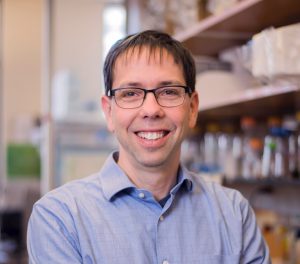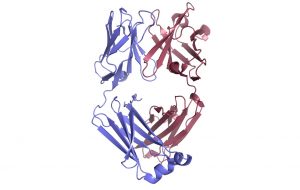FACULTY SPOTLIGHT: Brian Kuhlman, Ph.D.
Brian Kuhlman, Ph.D., is the dynamic co-developer of the popular molecular modeling software Rosetta. His laboratory in the Biochemistry and Biophysics Department at the University of North Carolina at Chapel Hill is creating new methods in Rosetta for designing proteins with novel shapes and functions. Over 40,000 scientists from around the world have obtained licenses to perform simulations with Rosetta, and the software is being applied to a number of important problems including: the design of new vaccines for HIV, the creation of new therapeutic antibody formats for treating cancer, and the engineering of protein switches to better understand cell biology.

Awarded the Foresight Institute Feynman Prize in Nanotechnology for the first design of a protein with a shape not seen in nature, Dr. Kuhlman’s laboratory is now focused on creating proteins with important applications in medicine and research. Towards this end, he has established a collaboration with Eli Lilly aimed at creating alternative antibody structures to enable new types of therapeutics. Traditional antibodies have two “arms” which both bind to the same antigen. By using Rosetta to reengineer how the different parts of an antibody assemble, the team of researchers from the Kuhlman and Lilly laboratories have been able to create antibodies where one arm recognizes one antigen and the other arm recognizes a separate antigen. Antibodies of this type are typically referred to as bispecific antibodies. There is tremendous interest in using this type of antibody to fight cancer, because they can be used to recruit a patient’s immune cells to their cancer cells, and initiate killing of the cancer cells. This collaborative project was first published in the journal Nature Biotechnology, and Lilly and UNC have filed for three patents based on the technology.
To expand the set of problems that can be tackled with bispecific antibodies, Dr. Kuhlman has also partnered with former members of his laboratory as a co-founder and scientific advisor of a small Biotech startup called Dualogics, which gives other scientists and companies worldwide the tools to create their own bispecific antibodies. For example, Dualogics has partnered with researchers in the UNC Department of Microbiology and Immunology to create a bispecific antibody for treating patients with Type 1 diabetes.
Another area of research that Dr. Kuhlman’s laboratory has focused on is the creation of proteins that can be turned on and off with light. These proteins are exceptionally useful because lasers can be used to activate them in specific regions of a cell or animal at specific time points. This allows researchers to study the function of the protein with more precision than is typically provided with traditional gene “knock out” or “knock in” capabilities. In one set of studies, the Kuhlman laboratory engineered a protein that remains in the cellular cytoplasm in the dark and can be selectively recruited to the nucleus with light. This switch allows researchers to turn genes on and off by simply flipping a light switch.
Kuhlman describes his love for proteins to his young son as this: “Proteins are the ultimate nanomachines. They are like robots. These robots can assist in carrying out every function in the body and throughout nature.” Kuhlman has translated his love of proteins and his love for building into a very innovative and collaborative science career… and ultimately he wants his science not only to be a helpful new therapeutic, but wants it to be fun.

Read more about our RESEARCH INTIATIVE:
